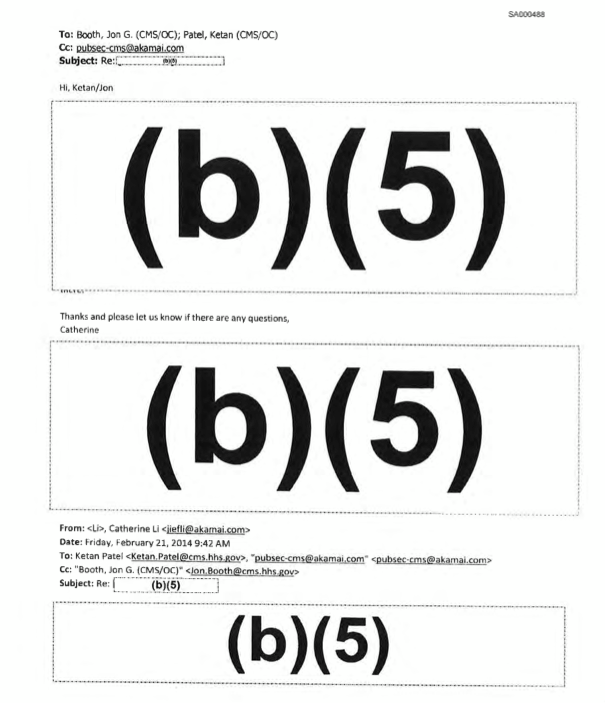- U.S. District Judge Tanya Chutkan calls speed of government response “unreasonable”
- When government offers to double the speed its response, Judge Chutkan replies: “But that will take us to, what, seven years instead of 14?”
I’ve been seeking public information on HealthCare.gov since the fall of 2013. Under Freedom of Information (FOI) law, the government is required to answer FOI requests within 20 business days. However, federal agencies routinely violate the law.
Unfortunately, the only remedy is for the plaintiff to sue the government—that costs time and money. What’s worse, the offending agency uses your tax dollars and Justice Department lawyers to defend itself.
When the Department of Health and Human Services (HHS) failed to properly respond to my HealthCare.gov FOI requests, I sued with the help of the conservative watchdog Judicial Watch. Judicial Watch has had unrivaled success in suing the government for FOI violations under Bush and Obama.
One strategy now routinely employed by the government when under a judge’s oversight is to offer to produce documents on a “rolling basis.” This gets the immediate monkey off its back without actually providing necessary information the reporter needs for a current story. It also serves to postpone challenges to redactions until the whole matter is done—years in the future.
In my case, once sued, HHS offered to provide 500 pages of material every other month. At a recent status conference, we pointed out to the judge that—at that rate—it would take roughly 14 years for the government to fulfill a request that under FOI law is supposed to be filled in 20 business day.
Inside the HealthCare.gov FOI lawsuit
U.S. District Judge Tanya Chutkan questioned the length of time HHS is taking to produce materials.
“I could do 500 pages in an afternoon. So I don’t understand this,” Judge Chutkan told the Justice Department attorney defending the case, U.S. Attorney Jeremy Simon. “And the plaintiff is right. This is like a 14-year schedule. This is unacceptable. So you need to tell me exactly what’s involved so I can assess this production rate of 500 pages every two months, because that’s not going to fly.”
“E-mails are time-consuming to review,” explained Simon. “They can be very dense, and they need to be reviewed line by line. The computer can only do so much in terms of identifying the universe for review, but once you actually get the universe, they need to be reviewed line by line.”
Judge Chutkan countered, “but 500 pages in two months, it’s like a couple of pages — it’s, what, 15 pages a day or something. That just seems to me — I want to know literally what is the process.”

Simon explained the layers.
“There’s two layers within the security review. So there’s an initial review, and then someone comes behind that person to double-check and make sure everything’s been caught. Then the document is reviewed for the FOIA withholdings by the FOIA specialist, and there’s two layers within there. Again, there’s an initial review, and then a second review to again double-check the work done by the first person. And then…”
“Four people have to review each document?” interrupted Judge Chutkan. “That doesn’t seem like an efficient use of government resources to me. Four people? Four layers of review?…That just seems unduly cumbersome. I understand there’s a risk of exposure; there’s personal information. But…it seems to me that this is just an unduly cumbersome process.”
When Simon explained that the agency felt the FOI request was overly burdensome and would involve at least 42,000 documents, Judge Chutkan persisted.
[quote]“I think it is unreasonable to only process 500 pages of responsive documents every two months. I think that is unreasonable.”–Judge Chutkan[/quote]
Simon, the government attorney, offered to consider producing 1000 pages every other month.
“Well, a thousand is better than 500, but that will take us to, what, seven years instead of 14?” replied Judge Chutkan. “I mean, I understand the process that you’ve laid out is time-consuming, but my position is the number of documents we’re talking about here is not a lot. It’s not. It seems to me that, notwithstanding the agency’s security and legal concerns, that it should be able to process these faster. I have other agencies in front of me who process documents faster with the same kind of security concerns, sometimes even greater security concerns. I don’t understand why it’s taking so long.”
Judicial Watch attorney Michael Bekesha argued it shouldn’t take so long.
“Your Honor, is 42,000 pages isn’t that much,” said Bekesha on my behalf. “I hate to compare it to other FOIA litigation and stuff that tends to be a little more controversial regarding Hillary Clinton’s e-mails, but that was 55,000 pages. That’s going to be complete by January of this coming year. Judge Contreras has about 8 percent being reviewed every month, what comes out to more than 500 pages, and that’s able to be done.”
At the conclusion of the status conference, Judge Chutkan said, “I really think that this is an unusually slow process given other FOIA litigation that are cases that are before me and other cases that are in this court.”
The next status update on the case will be in court on August 31.
“The next time — if the production schedule continues the way we’ve been going, I’m going to have some more questions next time that I think you may want to have an agency representative standing next to you to answer,” Judge Chutkan told the Simon, the Justice Department lawyer representing HHS.




I am a product liability attorney who defends, among others, pharmaceutical companies. As you may be aware, the documents needed to get a drug approved and the post-marketing safety monitoring process are enormous. I have been involved in document productions where my client has produce and my teams have reviewed millions of pages of documents and produced hundreds of thousands to repositories in an approximate 6 month to two year time frame. Usually, my client is just one of many companies sued who are doing similar document productions. There are numerous private vendors who can assist with computer aided and hands-on document reviews in a timely and cost-effective manner. If I would have suggested to a federal judge that I could produce 500 documents every other month, I would have been immediately escorted by a U.S. marshal to be locked up for contempt of court. For HHS attorney to suggest what they did is at best willful ignorance but more likely a fraud on the court.
Dear Sharyl,
Good luck in your quest to obtain anything of value from our corrupt government. It’s sad isn’t it, and the citizens continue to elect others just as bad. If you try to gather a crowd against the government, you’re branded a traitor, or get thrown in jail. I hope one day. We as a nation can put the government back where it belongs. Under the people, not on top of them.
Sharyl,
thank you so much for inspiring me and others to persist in fighting the bureaucracy to defend our rights, especially freedom of the press. The obstacles you overcome shape your character, and it is obvious that you a
I would like to let you know that you are a total “Hero” in my opinion. Please keep up the pressure
On this reckless government.